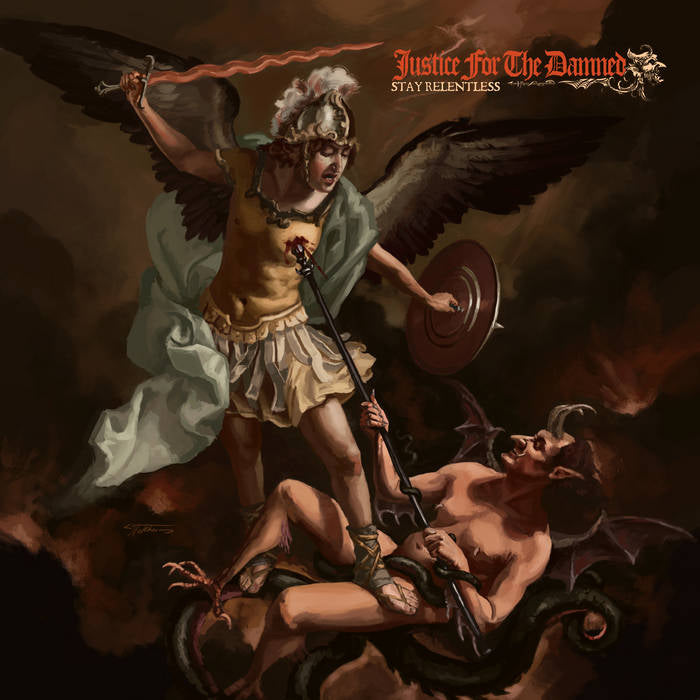
On Pain Is Power, Justice for the Damned cemented themselves as one of the most punishing forces in Australian deathcore — a band that thrived on sheer density. That record was a monument to heaviness: weighty breakdowns, stomping riffs, and an unflinching sense of violence that felt both physical and cathartic. With Stay Relentless, the Sydney outfit return leaner, sharper, and more methodical. But in refining their sound, they’ve also sanded away some of the rawness that made their previous work so suffocating. The result is a record that’s powerful in parts, yet inconsistent in impact — a mix of surgical precision and emotional distance.
“Retribution in Blood” kicks the album off with a thunderous statement of intent. Massive, almost tribal drums and a darker, more guttural vocal performance immediately signal a more commanding presence. The riffs are tightly coiled, the bass tone thick and menacing, and when the band locks in, it’s crushing. Yet, for all its power, the production’s slickness robs certain moments of their punch. The slower, drum-led passages feel hollow, like the air’s been vacuumed out between the hits. Compared to Pain Is Power’s relentless onslaught, the spaces here can feel too calculated — moments of restraint that don’t always pay off.
That push and pull between control and chaos defines much of Stay Relentless. “Built to Be Broken” stands as one of the album’s most crowd-ready anthems, all pit-stomping groove and throat-shredding projection — pure Kublai Khan energy filtered through Justice’s gloomier lens. “Every Lie You’ve Spoken” pushes the band’s new penchant for concise, sharply cut songwriting, leaning on layered backing vocals and tighter riff work. It’s a clear evolution in structure and pacing, but again, the clean, almost sterile production leaves you wishing for the grime and immediacy of their previous record. Even the title track, “Stay Relentless,” with its dissonant squeals and erratic drum fills, feels like it’s reaching for chaos through a polished veneer — wild on paper, restrained in execution.
Where Stay Relentless truly shines is in its rhythm section. The percussion is the backbone and often the saving grace of the record. From the explosive, almost mechanical precision of “The Current” to the snapping snare of “Ghosts of Tomorrow” and the frenetic blast-beat maelstrom of “Clawing Wounds,” drummer Nick Adams is the driving force behind the band’s evolution. “Clawing Wounds,” in particular, channels the eerie brutality of late-2000s Emmure, complete with spectral vocal layers and a breakdown that finally hits with the weight the rest of the record often aims for. When Justice for the Damned sound this locked-in, they’re unstoppable.
Still, the album’s middle stretch exposes some fatigue. “Cry Wolf” reuses familiar rhythmic formulas to diminishing returns, while “Eyes of a Killer” experiments with slower, more atmospheric pacing that never quite achieves the tension it seeks. The attempt at grandeur is admirable, but the execution feels muted — a symptom of the album’s overarching polish. Thankfully, the closing pair of tracks, “Writing Mass of Liars” and “Leave You Behind,” restore momentum and cohesion. Here, the band strikes the right balance between precision and ferocity: layered vocals, dynamic guitar interplay, and a production mix that finally delivers the density missing earlier on. It’s a strong finish that hints at the band’s untapped potential in this cleaner era.
Ultimately, Stay Relentless is both a refinement and a recalibration. It trades the raw, suffocating intensity of Pain Is Power for a leaner, more deliberate sound — one that highlights technical skill and songwriting discipline over sheer aggression. The trade-off, however, is that some of the record’s emotional heft and unpredictability are lost in the process. The drums dominate to the point of predictability, and the mix’s polished clarity sometimes undermines the very chaos that defines Justice for the Damned’s appeal.
Verdict: Stay Relentless is a step forward in precision but a step sideways in impact. Justice for the Damned remain a powerhouse, capable of crafting bone-crushing heaviness and arena-sized breakdowns, but their choice to streamline comes at a cost. At its best, it’s a testament to growth and control; at its weakest, it makes you long for the unrefined savagery that made Pain Is Power so thrilling.
NOTABLE TRACKS:
Built To Be Broken
The Current
Ghosts Of Tomorrow

